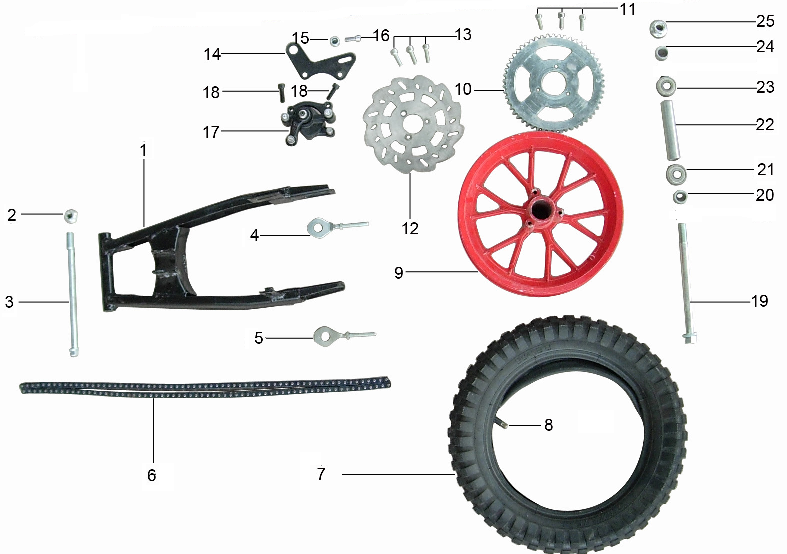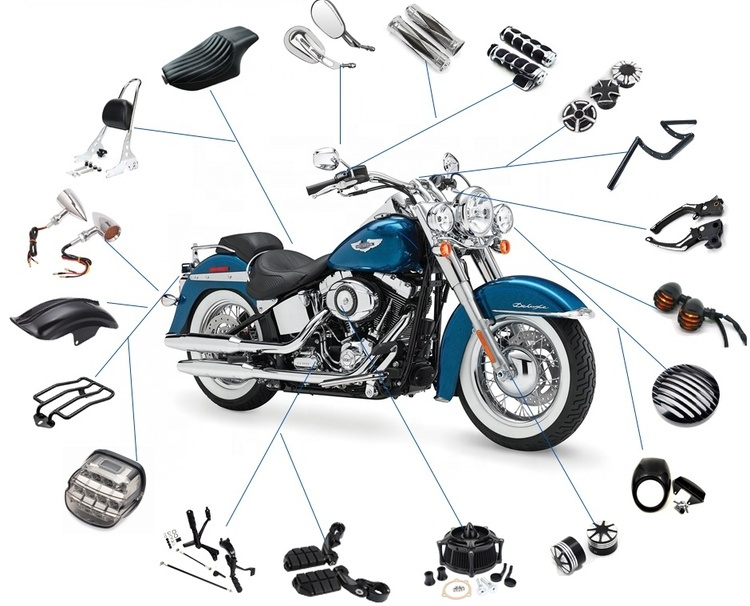Discover the Important MotorBike Parts You Need for Optimum Efficiency
Understanding the necessary components of a bike is fundamental for attaining peak efficiency. Each element, from the engine to the stopping system, plays a vital function in overall functionality and security. Regular maintenance can stop unanticipated failures and boost the riding experience. Numerous bikers forget the intricacies of these systems. Finding how they interact can result in an extra efficient experience. What critical parts should every cyclist focus on?
The Engine: The Heart of Your Motorcycle
The engine works as the core component of a motorcycle, driving its performance and specifying its capabilities. It is in charge of converting fuel right into power, which powers the bike forward. Various sorts of engines are used, consisting of single-cylinder, V-twin, and inline configurations, each offering unique features fit for different riding styles and objectives. The engine dimension, generally measured in cubic centimeters (cc), considerably affects performance, with bigger engines generally offering even more power and torque.Furthermore, the engine's design and technology, such as gas shot systems or air-cooling versus liquid-cooling, impact effectiveness and dependability. Maintenance is important for peak operation; variables like routine oil modifications and monitoring ignition system guarantee durability. Cyclists commonly take into consideration an engine's responsiveness and level of smoothness, as these characteristics boost the overall riding experience. Eventually, the engine remains an important component that specifies not just the motorcycle's performance but likewise the biker's connection to the device.
The Transmission: Changing Gears Smoothly
The transmission plays a crucial role in a motorcycle's efficiency, specifically in the auto mechanics of equipment moving. Comprehending how to shift gears efficiently can enhance the general riding experience, while routine maintenance assurances peak functionality. Correct focus to these elements can significantly impact the longevity and performance of the motorbike.

Gear Shifting Mechanics
Smooth gear shifting is essential for suitable motorbike performance, significantly affecting both acceleration and control. The technicians of gear shifting involve the interaction in between the clutch, equipment bar, and transmission system. When a motorcyclist engages the clutch, it disengages the engine from the transmission, enabling an equipment adjustment without damaging the parts. A well-timed launch of the clutch, incorporated with exact movement of the gear lever, assists in a seamless modification in between equipments. This process ensures that the engine runs within its finest power band, improving efficiency. Motorcycle Parts Auckland. In addition, comprehending the gear ratios and their effect on speed and torque can assist riders make informed options during changes, ultimately adding to an extra receptive and pleasurable riding experience
Upkeep Tips Relevance
Routine upkeep plays an essential duty in ensuring that the transmission system runs effectively, permitting for smooth gear shifts. Frequently inspecting and transforming the transmission fluid is essential, as old liquid can cause raised rubbing and wear. In addition, examining the clutch for wear guarantees peak involvement and disengagement, preventing slippage throughout gear changes. Lubrication of moving components is equally vital to reduce rubbing and improve efficiency. Motorcycle owners should likewise monitor for leakages and unusual noises, as these can show underlying problems. By sticking to these maintenance ideas, cyclists can prolong the life-span of their transmission system, guaranteeing that gear shifts continue to be smooth and adding to the overall performance of their motorcycle.
The Braking System: Ensuring Safety on Every Experience
Braking systems are fundamental components that directly affect a motorcycle's safety and security and efficiency. They include various components, consisting of brake pads, blades, calipers, and hydraulic lines, all functioning together to guarantee effective deceleration. The type of stopping system-- generally either disc or drum-- affects responsiveness and stopping power.Regular upkeep is vital to support peak efficiency; worn brake pads can bring about reduced efficiency and raised stopping distances. In addition, the high quality of brake liquid ought to be checked, as it can absorb moisture in time, jeopardizing stopping efficiency.Riders ought to also consider the value of anti-lock braking systems (ABDOMINAL), which prevent wheel lockup throughout sudden stops, enhancing overall safety and security. Correctly functioning brakes are not nearly quiting; they infuse self-confidence in the rider, permitting much safer navigating through different surfaces. Ultimately, a dependable stopping system is crucial for taking pleasure in every ride with comfort.
The Suspension: Enhancing Comfort and Control
A well-functioning shock absorber considerably adds to a motorbike's overall performance, matching the effectiveness of the stopping system. The suspension plays a considerable duty in taking in shocks from irregular surface areas, assuring a smoother trip while maintaining tire call with the road. This call is vital for both security and control, permitting riders to browse corners with self-confidence and precision.Different sorts of suspension systems, such as telescopic forks or mono-shocks, use differing levels of convenience and handling. Properly tuned suspension enhances responsiveness, supplying the rider with a more connected feeling to the motorbike. Normal upkeep checks are very important to identify the suspension elements, including springtimes and dampers, are operating at their finest. An effective shock absorber not just raises the riding experience however also adds to the durability of other motorbike components by decreasing damage. As a result, buying top quality suspension is essential for any severe motorcycle fanatic.
The Tires: Linking You to the Road
Tires play a necessary role in a motorcycle's performance, serving as the main web link in between the road and the motorcyclist. Comprehending the different kinds of tires offered can significantly impact managing and safety. Furthermore, regular maintenance is important to assure peak tire efficiency and long life.
Tire Keys In Explained
How do different tire types influence a motorbike's efficiency? Tire kinds play a crucial function in identifying a motorcycle's grip, handling, and stability. Sporting activity tires, developed for high efficiency, offer boosted grip and responsiveness on smooth roadways, making them optimal for competing and aggressive riding. Conversely, touring tires prioritize toughness and convenience, offering a smoother experience for long-distance travel. Off-road tires, characterized by their sturdy walk patterns, stand out in traction on unpaved surfaces, appropriate for adventure fanatics. Furthermore, dual-sport tires mix features from both on-road and off-road groups, satisfying versatile riding requirements. Ultimately, picking the appropriate tire type is necessary for maximizing efficiency, guaranteeing safety and security, and improving the total riding experience.
Maintenance Tips Offered
While riding when driving, keeping optimal tire problem is important for safety and performance. Regularly checking tire stress is vital, as under-inflated tires can result in bad handling and enhanced wear. It is suggested to check tread deepness often; used tires compromise grip and security. On top of that, cyclists must seek signs of damage, such as fractures or lumps, which can indicate the need for substitute. Revolving tires occasionally assures even use, improving long life. Furthermore, keeping tires clean from debris and staying clear of excessive aesthetics can prolong their life-span. Maintaining appropriate placement and balance contributes to come to a head efficiency, decreasing tension other on various other bike parts. Complying with these upkeep tips will substantially improve the overall riding experience.
The Gas System: Fueling Efficiency and Effectiveness
The fuel system plays a vital function in maximizing a motorbike's performance and performance, as it ensures the optimum distribution of gas to the engine. It makes up numerous critical components, including the gas storage tank, fuel pump, fuel filter, and fuel injectors or carburetor. go to this website Each part should work efficiently to ensure a smooth and effective ride.The fuel storage tank stores gas and provides it to the engine by means of the fuel pump, which generates the required pressure. A gas filter stops pollutants from entering the engine, while the injectors or carburetor mix gas with air for combustion.Proper upkeep of the gas system is vital; a blocked filter or malfunctioning injector can result in decreased efficiency and enhanced gas intake. By verifying that the gas system operates efficiently, motorcyclists can appreciate enhanced throttle feedback, far better gas economy, and overall improved riding experience.
The Electrical System: Powering Your Ride
A reliable electrical system is essential for the general functionality and safety of a motorcycle, as it powers important parts such as the ignition, illumination, and numerous digital systems. This system consists of the battery, which stores energy, and the alternator, liable for generating power while the engine runs. The wiring harness links these elements, making certain trustworthy power distribution.Additionally, fuses protect the system from overloads, while relays aid control high-current gadgets with low-power signals. A well-maintained electrical system boosts efficiency by making certain smooth beginnings and regular operation of signals and lights, essential for cyclist exposure and safety.Regular checks of the battery's cost and links are very important for protecting against electrical failures. Bikers must additionally examine circuitry for deterioration, making sure all parts function preferably. Inevitably, a robust electric system contributes considerably to the total efficiency and dependability of the motorcycle.
Frequently Asked Inquiries
How Typically Should I Change My Bike's Battery?
The frequency of motorcycle battery substitute depends on usage and maintenance (Oem Parts New Zealand). Generally, batteries should be replaced every 3 to five years. Routine checks can aid identify when a replacement is required for peak performance
What Devices Do I Need for Basic Bike Maintenance?
For basic bike upkeep, one calls for important tools such as a socket collection, wrenches, screwdrivers, pliers, tire stress gauge, and a torque wrench. These tools help with effective upkeep and ensure the motorcycle runs efficiently and safely.
How Can I Improve My Bike's The rules of aerodynamics?
To boost motorcycle aerodynamics, one should think about adjusting fairings, using windshield expansions, optimizing here are the findings body placement, and lowering total weight. These alterations assist reduce drag, boosting stability and gas performance throughout trips.
What Are the Indications of a Failing Electrical System?
Indicators of a falling short electric system consist of dimming lights, problem beginning, irregular instrument readings, and blown integrates. Motorbike Components NZ. Uncommon scents or rust around battery terminals may additionally indicate underlying concerns requiring prompt interest for security and performance

Just how Do I Pick the Right Oil for My Bike?
When picking oil for a motorbike, one must take into consideration the supplier's specs, thickness ratings, and the kind of riding. Additionally, artificial versus conventional oil can impact performance and engine protection, affecting the choice considerably. The engine size, commonly determined in cubic centimeters (cc), considerably affects performance, with bigger engines typically giving even more power and torque.Furthermore, the engine's style and technology, such as gas injection systems or air-cooling versus liquid-cooling, influence effectiveness and dependability. A well-functioning suspension system greatly contributes to a motorcycle's general efficiency, complementing the efficiency of the stopping system. The fuel system plays an essential duty in making best use of a motorbike's efficiency and performance, as it guarantees the ideal shipment of gas to the engine. A fuel filter protects against pollutants from getting in the engine, while the injectors or carburetor mix fuel with air for combustion.Proper upkeep of the gas system is important; a clogged filter or malfunctioning injector can lead to reduced performance and raised gas usage. A well-kept electric system boosts performance by making sure smooth beginnings and consistent procedure of signals and lights, vital for biker exposure and safety.Regular checks of the battery's charge and connections are vital for avoiding electric failures.